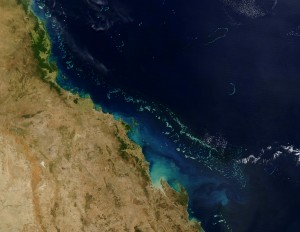Today’s question dives into whether the Great Barrier Reed is actually “dead” and what is causing it to die.
I stumbled upon this question as a trending topic of Facebook news section a few weeks back in the middle of November. Although Facebook may not be the best source for news because of the abundant “click bait” headlines, the headline I read: The Great Barrier Reef considered Dead. After surfing through the buzzfeed reactions and the endless opinionated mislead posts of individuals known as the Facebook comment section, I decided to do my own research on the topic.
The Great Barrier Reef is located off the northeastern coast of Australia and is the largest coral reef system in the world stretching 2,300 kilometerse long with countless speices of fish, turtles, starfish, and sharks. Known for its beautiful corals and unique underwater eco-system, the Great Barrier Reef is widely believed to be receding and dying due to a phenomena known as coral bleaching due to the baren white color the corals take after algae and nutrients are absent. Corals can survive a bleaching event but are exponentially vulnerable to the environment. Marine Biologists speculate reasons as to why coral bleaching is rapidly spreading across the Great Barrier Reef and here is why:
- Change in Oceanic Temperatures (Global Warming) – Thought of as the leading cause of coral bleaching, as water temperatures rise corals expel algae known as zooxanthellae living in their tissues causing the coral to turn completly white.
2. Run-off and Polution shore – Storm generated run-off precipitation can rapidly dilute ocean water and can carry land pollutants which aversely affect coral reefs.
3. Overexposure to sunlight – High exposure to sunlight results in high solar irradiance which attributes to coral bleaching.
4. Abnormally low tides – Exposure to the air during extreme low tides can cause bleaching in shallow corals.
CNN recently posted an article disclaiming that the Great Barrier Reef is dead stating there is a difference between “dead” and dying”. I am in the belief that arguing over whether the Great Barrier Reef is dead or dying is petty and more efforts should be attributed to preserve the reef and conserve the living corals rather than arguing the state of living of world’s biggest organism.
Thanks for the read!
-Sammy Lee




Very interesting blog! Nowadays, I think that preserving nature should be one of the world’s main focuses. After reading your article, I felt a sense of urgency to help protect the environment and to stop the coral reefs from getting any worse. Since your blog did not include any scientific studies to prove that the reefs are doing worse than before, I wish that your blog included ways that humans can help the environment. When I researched possible ways that I could help the environment, specifically the coral, many ideas were presented. Here is a link to some of the ideas that you can read yourself: http://www.nature.org/ourinitiatives/habitats/coralreefs/ways-to-help-coral-reefs/ .
Interesting blog post, but it needs a little more. Love the topic of the Great Barrier Reef, I mean wildlife is astonishing when alive, and the fact that it is depleting due to human activity and global warming conditions is just sad. Though you give good information, you should analyze the actual article with certain experiments, of such as to what point of change in oceanic temperature cause “coral bleaching”? You have nice sources but you should cite statistics of such experiments, such as one mentioned within here: http://newsactivist.com/en/articles/env-492-global-environmental-issues/coral-bleaching-case-study , to further analyze how factors affect coral and cause them to bleach or die. Everyone loves a good ecology article, as this post has high potential with such a relevant topic.
This is a very interesting topic! I see you did adequate research as you listed four possibilities as to why the reef is in its current state. I also agree the debate over whether the reef is dying or already dead is a useless one. What the debate should be over is how to reduce the coral bleaching that continues to plague the reef. Since this iconic place may not have much time, people need to help protect it now, no matter if it is dead or alive. Take a look at this link that has a bunch of ways to help out the reef and the extensive marine life within it.
http://www.coolaustralia.org/challenges-and-solutions-for-the-great-barrier-reef/